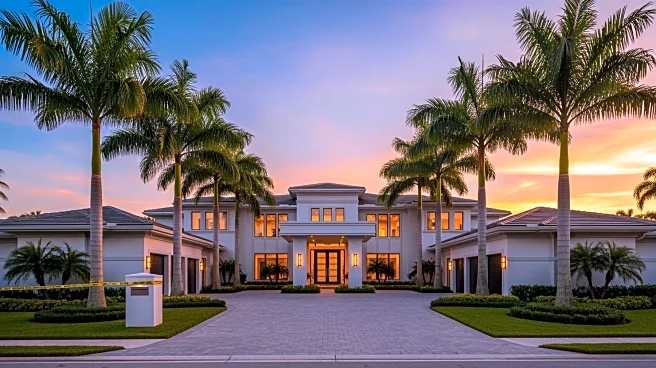What's Happening?
The Weeknd, a Grammy-winning Canadian singer-songwriter, has purchased a $50 million mansion in Coral Gables, Florida. The acquisition follows his successful tour stop in Orlando, which set a record for attendance at Camping World Stadium. The mansion,
located at 41 Arvida Parkway, spans 18,000 square feet and features eight bedrooms, nine and a half bathrooms, and a five-car garage. It is situated on a unique V-shaped peninsula with 574 feet of Biscayne Bay water frontage, a 200-foot private dock, and a massive pool. The property boasts impressive design elements, including curved walls, a grand bifurcated staircase, and soaring ceilings. The sale was managed by Eddy Martinez of One Sotheby’s International Realty, with Angel Nicolas of Serhant representing The Weeknd.
Why It's Important?
The Weeknd's purchase of this high-value property underscores the financial success and influence of artists in the music industry. It highlights the economic impact of successful tours, which can lead to significant personal investments. The acquisition also reflects the growing trend of celebrities investing in luxury real estate in Florida, a state known for its favorable tax policies and appealing climate. This move may influence other artists and high-net-worth individuals to consider similar investments, potentially boosting the local real estate market and economy.
What's Next?
The Weeknd's acquisition may prompt further interest in Florida's luxury real estate market, attracting more celebrities and affluent buyers. Real estate agents and developers might capitalize on this trend by marketing high-end properties to similar clientele. Additionally, The Weeknd's presence in the area could lead to increased media attention and tourism, benefiting local businesses and the economy. As the artist continues his career, further investments in real estate or other ventures may follow, reflecting his evolving financial strategy.
Beyond the Headlines
The purchase of such a high-profile property by The Weeknd may have cultural implications, as it reflects the lifestyle and aspirations associated with celebrity status. It also raises questions about the sustainability and environmental impact of maintaining large estates, particularly in coastal areas vulnerable to climate change. The transaction highlights the intersection of entertainment, real estate, and economic trends, offering insights into how public figures influence market dynamics and societal perceptions.

















